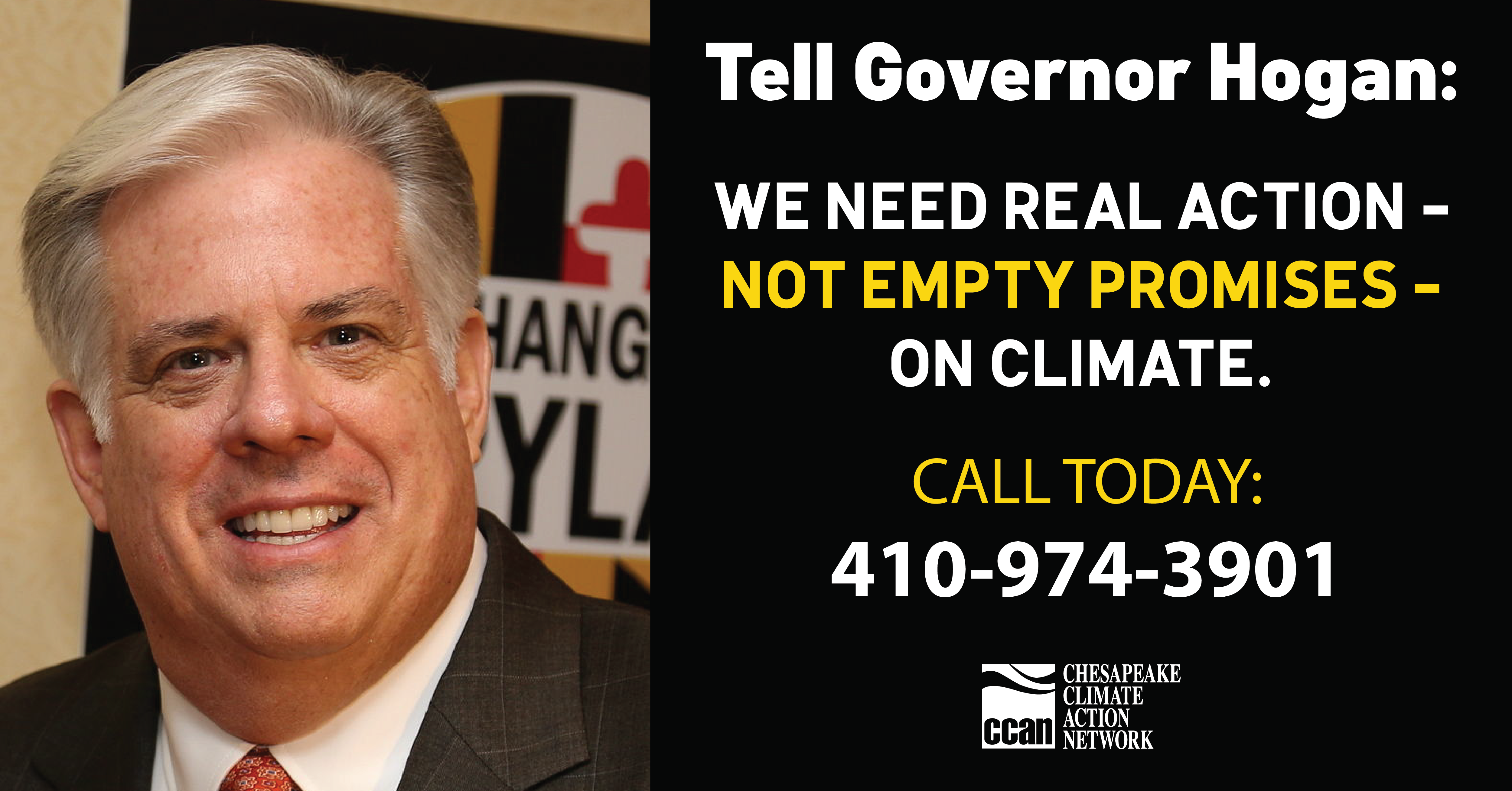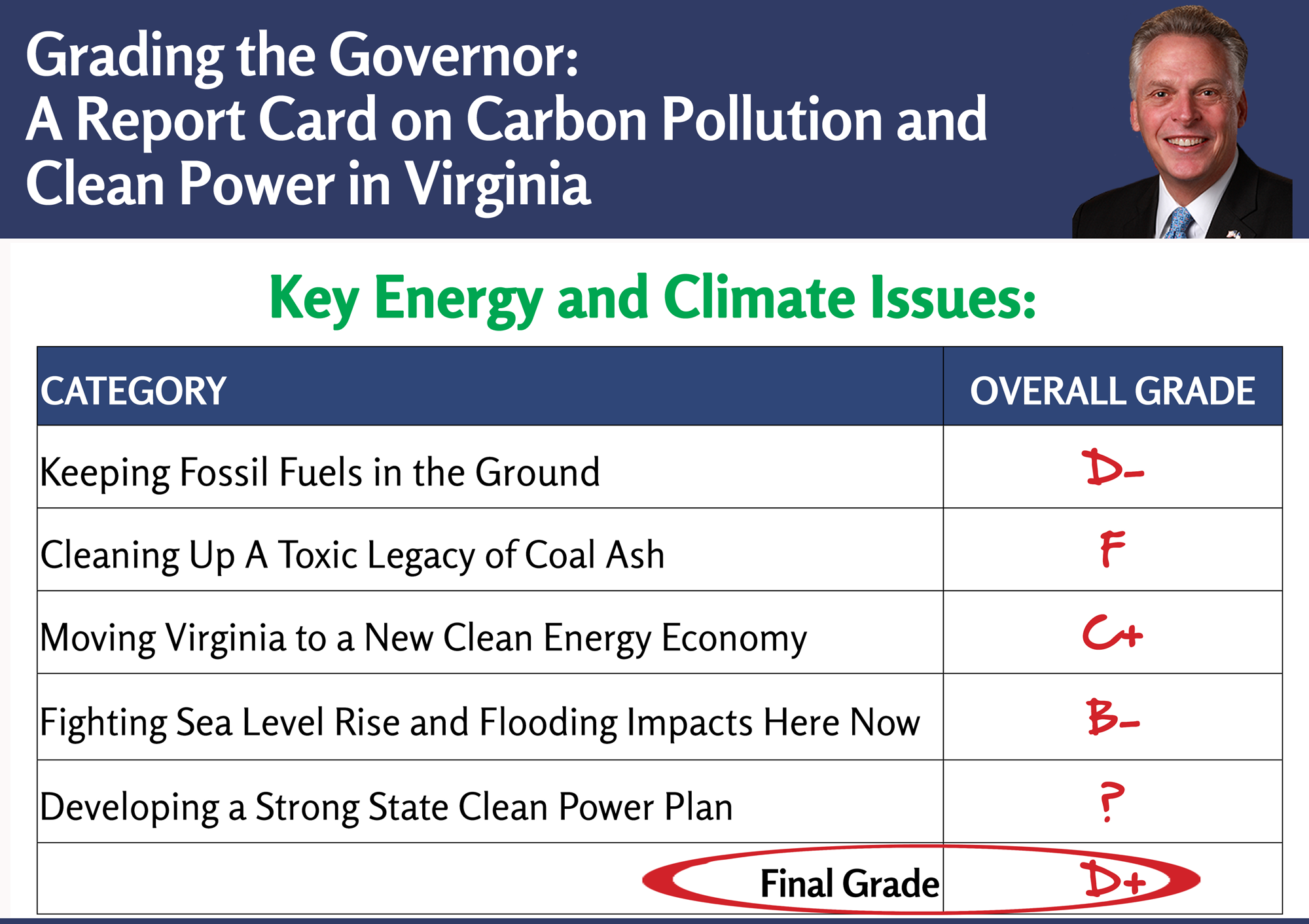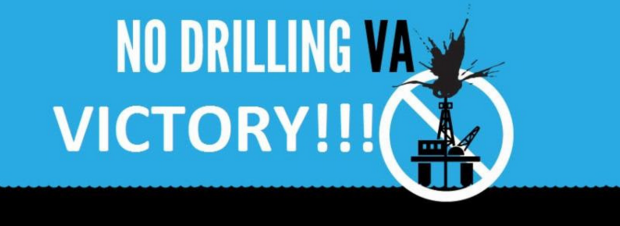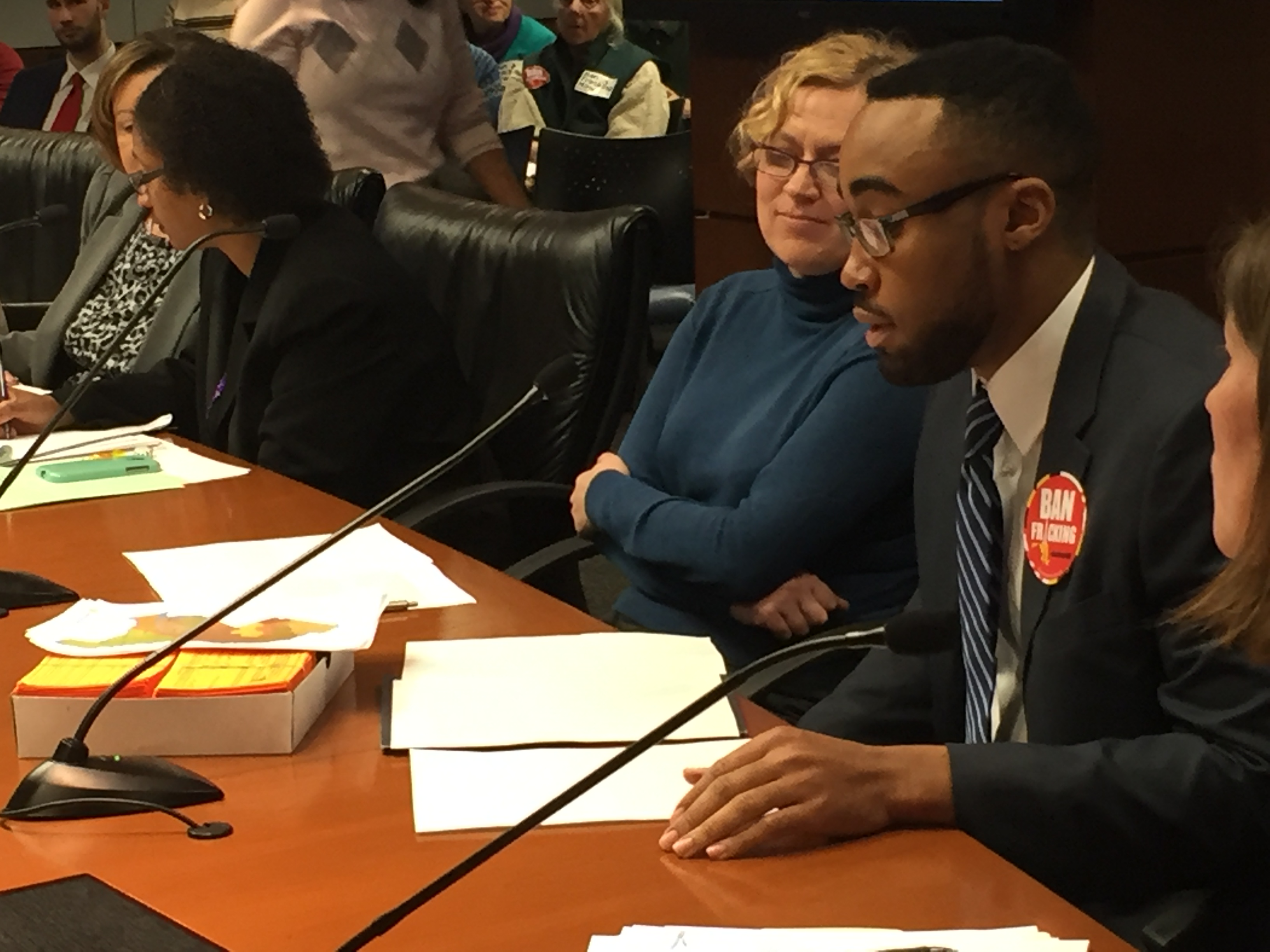The first week of July marked the start of an international week of action aimed at highlighting the growing opposition to dangerous oil trains in the US and Canada. With over 70 events taking place across North America, this event is scheduled to commemorate the 47 people killed in the Lac-Mégantic 2013 oil train disaster by people taking up the struggle to fight against these oil trains in own communities.
As participants in the week of action, CCAN coordinated with members of Clean Water Action to raise awareness about the dangers that oil-train blast zones pose to the Baltimore community.
A number of Baltimore’s most iconic institutions are located in the “blast-zone”, which activists highlighted by using light projections on places like the National Aquarium and during the Baltimore Artscape Festival.


Additionally, on Wednesday July 6th CCAN and Clean Water Action delivered over 2000 petitions and handwritten letters to City Council President Jack Young calling for further action to be taken against dangerous oil trains in Baltimore city.

Click here to add your name to our petition demanding the Baltimore City Council to pass Health and Safety Ordinance for oil trains in Baltimore.
 Wrapping up the week of action, activists participated in a Banner Drop at Camden Yards in Downton Baltimore in protest of oil trains that run alongside the stadium and threaten this beloved Baltimore institution.
Wrapping up the week of action, activists participated in a Banner Drop at Camden Yards in Downton Baltimore in protest of oil trains that run alongside the stadium and threaten this beloved Baltimore institution.
The international week of action to #StopOilTrains reaffirmed the growing movement across North America to take back our communities from oil companies and explosive oil trains. Now, more than ever, is the time to get organized and get loud. To get involved, attend our monthly volunteer meetings to plan and strategize how to make our voices as loud as possible.
Volunteer Meetings are held the last Wednesday of the month at 6pm at Impact Hub located at 10 E North Ave, Baltimore, MD 21202. Click here to RSVP.
It's time: Join the call to ban fracking in Maryland
Governor Hogan issued us a new challenge when he vetoed legislation to expand our renewable energy standard. He thumbed his nose at a decade of bipartisan climate progress in Maryland and, until we overturn his veto, he temporarily blocked our path to new jobs and cleaner air.
But you know what else? Governor Hogan fired us up even more to fight for what we know is right.
This summer, CCAN and our allies in the “Don’t Frack Maryland” coalition are moving full-speed ahead with an all-out campaign to permanently ban fracking in our state. We’re launching this long-planned effort even as we commit to overturning Hogan’s harmful clean energy veto. And we’ll need your help right from the start!
Join us next Wednesday evening, June 15th, for a statewide grassroots conference call to kick off a summer of organizing to ban fracking. Climate champ Heather Mizeur will be our special guest!
Heather will help get us fired up for action. I will give you the latest updates on the fight against fracking across the country and the world, as well as the momentum we’re already seeing towards a permanent ban right here in Maryland.
Then, we’ll dig in on how you can make the biggest difference this summer: by working in your own communities to ban fracking. After the call, we’ll send you our hot-off-the-presses activist toolkit with everything you need to get started.
Just over a year ago, we made history by passing a two-year moratorium on fracking that prohibits dangerous drilling through October 2017. That clock is now ticking down.
Unless we act in the next General Assembly session, our hard-won moratorium will expire and the Hogan administration could finalize regulations that invite the fracking industry in. We can’t let that happen. The science is in. Fracking pollutes the air we breathe and the water we drink, and threatens local economies, all while worsening climate change.
That’s why CCAN is gearing up THIS SUMMER to educate more Marylanders about the dangers of fracking, to help more cities and counties ban the practice, and ultimately to build the grassroots power we need to win.
Join me, CCAN organizers — and special guest Heather Mizeur — on Wednesday, June 15th at 7pm to find out how you can be a part of permanently banning fracking in Maryland this year.
Already, over 70 groups (and counting) in Maryland have called for passage of a permanent fracking ban – from climate groups like us, to environmental groups like our friends at the Maryland Sierra Club – who just announced their support this morning – to riverkeepers, outfitters, service unions, health groups, farmers and faith leaders. And Maryland’s two most populous counties — Montgomery and Prince George’s — have effectively banned the practice.
With or without Governor Hogan, we’re ready to move forward — not backwards — on climate in Maryland. That means keeping clean energy solutions on the fast-track while keeping harmful fossil fuels like fracked gas in the ground.
RSVP now and help us launch a summer of organizing to ban fracking!
Hogan vetoed clean energy progress. Call him today!
Last Friday, just before the long holiday weekend, Governor Larry Hogan made a deeply harmful and hypocritical decision to veto the Clean Energy Jobs Act.
The Baltimore Sun called the Governor’s move “short-sighted.”1 Bill sponsor Delegate Bill Frick called it “infuriating.” I‘d call it flat-out wrong. And, with your help, we WILL overturn it.
Thousands of Marylanders like you fought to pass this bill, and increase our state’s renewable energy standard to 25% by 2020. With this shocking veto, Governor Hogan has frozen the promise of thousands of new jobs, cleaner air, and a safer climate. And he’s put the jobs of hundreds of Maryland solar installers at immediate risk.2
As a first step, we need to make sure Governor Hogan understands the line he’s crossed.
Pick up the phone and call Governor Hogan today. Tell him Marylanders will not stand by and let him stall our clean energy progress!
In his veto letter, Governor Hogan misleadingly called the Clean Energy Jobs Act a “tax” on ratepayers. We know it’s an investment in a brighter, more just future.
Marylanders pay a high cost for dirty energy now — every time a business floods from rising seas or a child misses school for asthma. With an investment of less than a penny per day per resident, we can get a quarter of our electricity from clean sources within five years, saving lives through cleaner air and lowering bills over the long-term. In fact, the Hogan administration’s own study confirms that our current clean energy standard is a multi-billion dollar boon to Maryland’s economy.
With his veto, Governor Hogan not only misled the public, he backtracked on his own policy. The Governor recently signed legislation requiring a 40% cut in greenhouse gas pollution by 2030. Now he’s vetoed our number one tool to curb emissions. So what’s his plan?
Call Governor Hogan now. Tell him Marylanders want action — not empty promises — on climate change.
Thanks to your action, we passed the Clean Energy Jobs Act with bipartisan support and veto-proof majorities in the General Assembly. Over 71% of Marylanders and over 170 small businesses across the state support expanding our use of renewable energy.
Governor Hogan sent a message that he is not listening to his constituents, the General Assembly, or business leaders.
Now it’s time for us to send a message to Governor Hogan.
Next, we will work together to override this veto!
The Grades are In on Governor McAuliffe
Here at CCAN, we believe grading “curves” have their place. But not when it comes to climate leadership. When the stakes are so high — when coastal neighborhoods are already flooding at “normal” high tides and when extreme heat, storms, ice melt, and wildfires keep shattering records — we believe it’s our job to hold our leaders to the highest standards. When scientists warn we must keep 80% of the world’s known fossil fuel reserves in the ground to have a chance of stabilizing the climate, climate leadership requires championing clean energy solutions 100% of the time.
From this perspective, we released a first-of-its-kind, comprehensive report card this week, giving Governor Terry McAuliffe some mid-term feedback on his two-year climate and energy record in Virginia.
The Governor earned an interim “D+” average across five categories. Governor McAuliffe has fallen far short compared to his promises as a candidate and in light of the growing urgency of the climate crisis. You can read the full report and read why here.
While we give the Governor credit for positive steps – like modest solar and efficiency measures, a veto of coal tax credits, and securing federal funds to combat sea-level rise – his championing of decades more reliance on fracked gas threatens to have a far more substantive, long-term negative impact.
For example, Governor McAuliffe has lobbied for major new fracked gas pipelines – Dominion’s Atlantic Coast Pipeline and the Mountain Valley Pipeline – that could trigger more greenhouse gas pollution than all of the state’s current coal- and gas-fired power plants combined. He’s also pushed for opening up Virginia’s coastal waters to offshore drilling (only to see that plan, thanks to an outpouring of grassroots opposition, withdrawn by President Obama).
But Governor McAuliffe also gets a major “incomplete” – and a major chance to rescue his average – when it comes to the federal Clean Power Plan.
Some great allies – leaders with Virginia Organizing, the Virginia Student Environmental Coalition, and Interfaith Power & Light (DMV), as well as landowners fighting fracked gas pipelines and riverkeepers fighting to protect our rivers from coal ash – joined CCAN Director Mike Tidwell on a conference call with reporters to get this message out. And it was picked up by news stories we generated in the Roanoke Times, on Washington’s WAMU radio station, in the Virginian-Pilot, on Blue Virginia, in the Bay Journal, and more.
As Joelle Novey, director of Interfaith Power & Light, said, “We’re calling on Gov. McAuliffe now to implement a strong Clean Power Plan in Virginia that maximizes reductions in heat-trapping climate pollution.”
By designing a state plan that puts a strong cap on total pollution from both existing and future power plants – and fully embraces wind, solar and efficiency solutions – the Governor can still transform his legacy. Of course, this will require standing up to the state’s biggest polluter and biggest non-party campaign donor, Dominion Virginia Power. Not surprisingly, Dominion would rather the Governor adopt a “rate-based” workaround, rather than put a so-called “mass-based” cap on total emissions. That would allow the company to continue its heavy reliance on fracked gas and to continue increasing its carbon emissions for decades to come.
If the Governor is serious about his campaign promises – to act on climate and to let science be a strong guide – he has a clear chance now to get back on track.
As Laura Cross, a University of Virginia sophomore and member of the Virginia Student Environmental Coalition, said during the call with reporters, “We won’t settle for less because the climate crisis demands no less.”
Scroll through the full report here:
McAuliffe-Report-Card-Climate-Energy
Letter from the Director: Organized people are winning!
Dear CCANers,
Everyone knows that Big Oil is the most powerful special interest on Earth. So here’s the question: Can activists in one U.S. state like Virginia really stop the oil barons from drilling off the coast of Virginia Beach?
And what about Big Gas? The frackers virtually rule America. Can two suburban counties with shale gas deposits in Maryland really send the frackers packing? And what about trash incineration? Can citizens in one Baltimore neighborhood take down a proposed mega-dirty incinerator project that everyone thought was a done deal?
Turns out, the answers to these questions are yes, yes, and again yes! Across the Chesapeake region of Maryland, Virginia and DC, it’s been a year full of people-powered victories so far.
In Virginia, on March 15th, Obama administration announced that no oil companies will be allowed to drill off the fragile shores of coastal Virginia for at least the next five years (and perhaps forever). The decision came after thousands of Virginians submitted comments in strong opposition to offshore drilling. And leaders from the tourism, business, faith, student, and environmental communities campaigned openly and noisily against Governor Terry McAuliffe’s unacceptable support for ocean drilling. Once again: organized people can beat organized money. Go Virginia!
And on April 12th, the Prince George’s County Council – on Maryland’s border with DC — voted unanimously to ban gas companies from fracking along a gas deposit that runs under the county. The vote came after landowners, homeowners, students, businesses and others from across the county signed petitions, packed hearing rooms, and said “no!” (A year earlier, the County Council of neighboring Montgomery County did the same thing). Now CCAN and our partners are turning our attention toward passing a permanent, legislative statewide ban on fracking in the Maryland General Assembly in 2017. Stay tuned.
Meanwhile, in Baltimore, a David vs. Goliath fight to stop the nation’s largest trash-burning incinerator achieved a key victory in March. Students and utterly determined neighbors in Curtis Bay succeeded in pressuring Maryland regulators to finally terminate the company’s permit. Twenty-year-old Destiny Watford, who helped lead this fight, just won the prestigious Goldman prize for her visionary work for environmental justice against a power company that wanted to soak her neighborhood in more mercury, soot, and other pollutants from the combustion of trash.
I’m happy to say that in all of these fights across the region, CCAN played a key part in building the winning coalitions that got the job done. What’s next? Well, get ready D.C. Two of the most exciting upcoming fights include passing a historic carbon “fee and dividend” bill in the District of Columbia and also getting the nation’s capital to commit to 50% clean electricity.
And, oh yeah, at the risk of burying some real headlines, the Maryland General Assembly also passed two major bills to fight climate change in its just-ended 2016 session. One, supported and signed by Republican Governor Larry Hogan, mandates a statewide 40% cut in carbon pollution by the year 2030. The other mandates that 25% of the state’s electricity come from renewable energy by the year 2020.
I get tired just writing about all of this hard-won progress. But I’m never too tired to move on to the next clean-energy campaign in our region. You are the reason we win. You are the reason we keep fighting.
On we go,

Mike Tidwell
Report from the DC Circuit: Federal Court Hears Case Against Cove Point Export Facility

Using every tool available, CCAN and many others have been fighting the massive Cove Point liquefied natural gas (LNG) export terminal for over three years. The facility, located on the Chesapeake Bay in southern Maryland, would be the first LNG export terminal on the East Coast, linking the fracking fields of Pennsylvania, West Virginia, and Ohio to Asian markets. The fight on the ground continues, but our legal fight against the facility reached a significant milestone yesterday. That’s when Earthjustice Managing Attorney Deborah Goldberg faced off with the Federal Energy Regulatory Commission (FERC) and its friends before the DC Circuit Court of Appeals.
Several CCAN staffers and I joined Leslie Garcia and Cindy Peil with Calvert Citizens for a Healthy Community in the gallery to watch the argument.
You may remember that Earthjustice filed the lawsuit, EarthReports v. FERC (No. 15-1127), in May 2015 on behalf of CCAN, Patuxent Riverkeeper, and the Sierra Club. We had to wait to file suit in federal court until FERC officially denied our request for a rehearing. It took the agency seven months to deny our request, even as it approved order after order allowing Dominion to begin construction.
Deborah had eight short minutes to present her argument. Her goal was to show the court that FERC shirked its duty under the National Environmental Policy Act (NEPA) by failing to fully assess the direct and indirect environmental impacts of exporting nearly a billion cubic feet of gas every day for 20 years. Essentially, she argued, FERC’s finding of “no significant impacts” was based on not looking very hard. (You can hear the entire oral argument here.)
She first argued that FERC failed its duty under NEPA when it found that the export facility would not promote any regional gas development. That this massive facility would induce gas development not only makes logical sense, but it’s also backed up by facts. She reminded the court that a Pennsylvania-based energy company plans to drill new wells and ship the gas to Cove Point for export to Japan. She stressed to the court that this new gas production would require the use of millions of gallons of water, thousands of truck trips, and would greatly impact the lives of people living near the not-yet-drilled wells.
She also argued that FERC fell far short of its statutory obligations by refusing to take the lifecycle climate emissions of the project into account. Even the direct emissions of two million tons of greenhouse gases per year, she argued, should have triggered a finding of significance. When you take the lifecycle of natural gas into account, the emissions increase to 26 million tons per year—about the same emissions as Maryland’s entire fleet of coal-fired power plants.
In a strange twist, the energy giant BP was on our side of the aisle yesterday. Before Dominion proposed to expand and convert the terminal, Cove Point was a mostly dormant import facility. Energy companies, including BP and Statoil, had contracts to import natural gas to the terminal. Dominion granted Statoil the opportunity to relinquish its import capacity, but did not grant BP the same opportunity. BP was challenging FERC’s approval of this arrangement.
The attorney for BP walked the judges through the Natural Gas Act and explained why BP should have gotten the same opportunity as Statoil to get out of its contract. The issue was complex, though narrow, and seemed to capture the attention of all the judges on the panel.
Once the petitioners–EarthReports and BP–had finished arguing, it was the respondents’ turn to respond. FERC was joined by Dominion and the American Petroleum Institute, both of which had intervened on FERC’s behalf.
FERC’s attorney was most prepared to discuss the environmental issues but the judges focused the majority of their attention on BP’s claim. While that focus meant that FERC did not have much opportunity to respond to our environmental claims, it also seemed to distract the judges from the larger and more impactful issues at stake. Allowing BP to terminate its contract early has far less of an impact than forcing FERC to fully account for the human and environmental costs of the unprecedented natural gas expansion it’s facilitating.
When FERC’s attorney was able to respond to our environmental claims, she argued that any indirect effects were too speculative for FERC to consider.
Dominion argued that FERC conducted a sufficiently thorough review of the relevant information. Judge Rogers pushed back. Sure, she said, an agency could write 215 pages, but if it left out the main analysis it wasn’t worth much. Summing up our argument, the judge said that these natural gas infrastructure projects have impacts beyond the facility itself that aren’t being considered. “It’s not as if we’re planting flowers here.”
The lawyer from API had nothing new to add.
Deborah had saved two minutes for rebuttal and did an excellent job. Every party was in agreement, she said, on the key question: What effects will this project cause? She argued that Dominion’s liquefaction plant is the “crucial link” inducing demand for more gas drilling. FERC had produced an environmental assessment that turned “a blind eye” to the evidence before it.
She pushed back against FERC’s claim that we were asking the agency to speculate. Federal agencies, from the Environmental Protection Agency to the Council on Environmental Quality, are pushing FERC to consider indirect effects, other agencies are actually doing it, and FERC itself, in subsequent reviews, has even done it. She concluded by asking the DC Circuit to send the order back to FERC for it to conduct a full Environmental Impact Statement.
Every brief we submitted in this case has emphasized FERC’s failure to adequately address the safety threats to nearby residents in Lusby, Maryland. The liquefaction plant in Lusby would be built in closer proximity to residences than any other facility previously approved by FERC. Additionally, our briefs stressed how foreign tanker ships could threaten the critically endangered North Atlantic Right Whale.
This case is one of several where environment groups are challenging FERC approval of natural gas export infrastructure. In November, the DC Circuit heard challenges by Sierra Club and Galveston Baykeeper to FERC’s approval of LNG export facilities at Sabine Pass, Louisiana and Freeport, Texas. Sierra Club has also challenged FERC’s approval of the Corpus Christi, Texas, LNG export facility. That case is fully briefed, but has not yet been set for oral argument.
The court has no deadline to decide our challenge. It’s possible that it’s waiting to hear all the cases against the export facilities before deciding.
Keeping the pressure on Dominion
 The past few months Virginians across the state have risen up to fight Dominion’s plans for coal ash disposal into our rivers. After Dominion unveiled its disastrous plans to dispose of this waste into waterways — at allowable toxin levels far exceeding those of neighboring North Carolina — we’ve learned a lot. We’ve learned Dominion dumped 33.7 million, later *revised* to 27.5 million gallons, of untreated coal ash wastewater into Quantico Creek last May. We’ve learned the Director of our Department of Environmental Quality, David Paylor, took a trip to the Master’s Golf Tournament on Dominion’s dime; they even paid for a nice bar tab, too! And we’ve learned that Governor Terry McAuliffe is more willing to side with Dominion than with us.
The past few months Virginians across the state have risen up to fight Dominion’s plans for coal ash disposal into our rivers. After Dominion unveiled its disastrous plans to dispose of this waste into waterways — at allowable toxin levels far exceeding those of neighboring North Carolina — we’ve learned a lot. We’ve learned Dominion dumped 33.7 million, later *revised* to 27.5 million gallons, of untreated coal ash wastewater into Quantico Creek last May. We’ve learned the Director of our Department of Environmental Quality, David Paylor, took a trip to the Master’s Golf Tournament on Dominion’s dime; they even paid for a nice bar tab, too! And we’ve learned that Governor Terry McAuliffe is more willing to side with Dominion than with us.
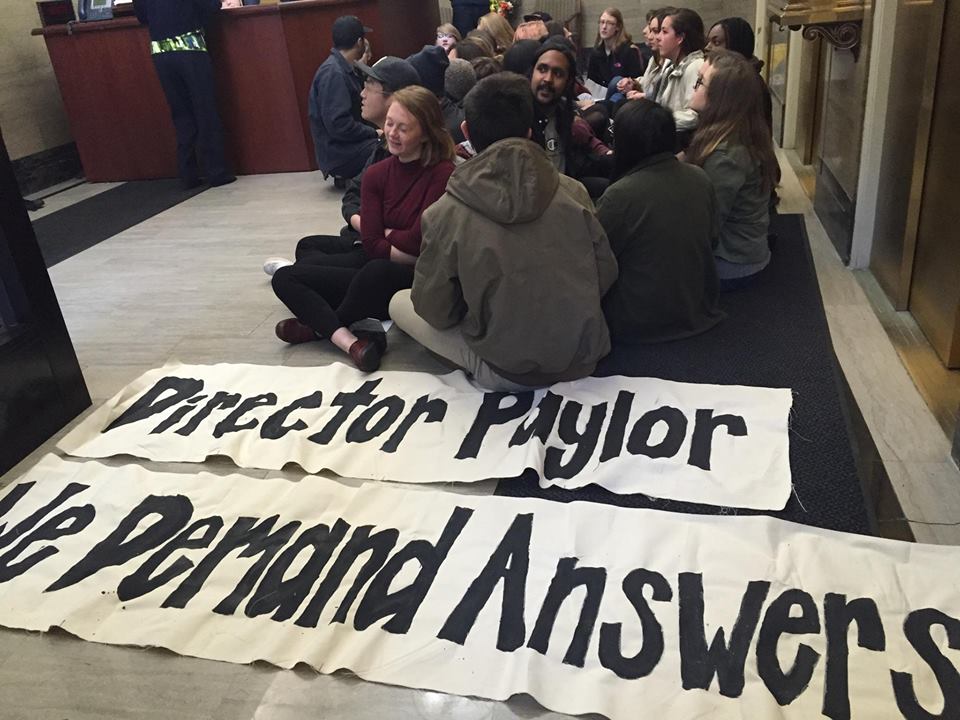
None of that has changed Virginians’ minds that this plan for toxic coal ash disposal has to stop. And it’s led to some of the most inspired resistance I’ve ever seen in Virginia. Over 600 strong marched in Richmond, students peacefully occupied the Department of Environmental Quality demanding answers, and citizens across the state are mobilizing to organize film screenings, workshops, and trainings to fight back.
I think we’ve reached a tipping point. Virginians are tired of business as usual — namely, Dominion getting its way. We’re tired of Dominion using its money to buy off our legislators. We’re tired of Dominion killing bills to promote wind and solar power. And we’re tired of Dominion pushing its dirty Atlantic Coast Pipeline down our throats.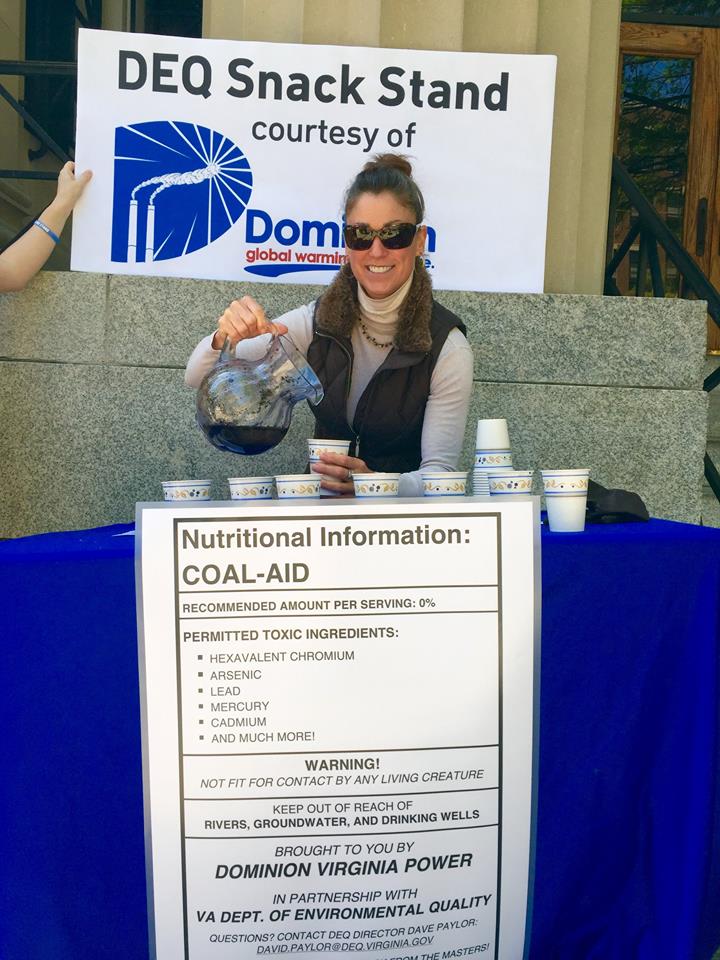
So we’re pushing back, because this fight is far from over. Potomac Riverkeeper Network and the Southern Environmental Law Center continue to challenge the legality of Dominion’s dewatering permit at the Possum Point Power Station. They’ve called on the Environmental Protection Agency to launch a criminal investigation into Dominion’s dumping in Quantico Creek last summer, and we’re working to support their call. We’re continuing to bring attention to the cozy relationship between Dominion and DEQ, and have no plans of stopping.
 Next up, DEQ will be releasing the draft permits for Dominion’s handling of the solid coal ash waste piled up in its ponds across Virginia — and we plan to fight them tooth and nail. We already know they are inadequate, because Dominion wants to leave the toxic coal ash in dated, unlined landfills right along our rivers. Instead of moving the toxic ash to modern, lined landfills like North Carolina is doing, or going ‘coal ash free’ like South Carolina, Dominion wants to let its pits leach heavy metals into our groundwater for decades to come. If they have it their way, we’ll see carcinogens such as arsenic, cadmium, mercury, and hexavalent chromium make their way into our drinking water for decades to come.
Next up, DEQ will be releasing the draft permits for Dominion’s handling of the solid coal ash waste piled up in its ponds across Virginia — and we plan to fight them tooth and nail. We already know they are inadequate, because Dominion wants to leave the toxic coal ash in dated, unlined landfills right along our rivers. Instead of moving the toxic ash to modern, lined landfills like North Carolina is doing, or going ‘coal ash free’ like South Carolina, Dominion wants to let its pits leach heavy metals into our groundwater for decades to come. If they have it their way, we’ll see carcinogens such as arsenic, cadmium, mercury, and hexavalent chromium make their way into our drinking water for decades to come.
But we have no intention of letting that happen. Together, we’ll continue to fight Dominion’s plan in the courts, in the media, and in the streets. Dominion’s a tough player. We’ve known this for years. But I don’t think Dominion has seen an uprising take off this quickly before. And I can feel we’re onto something.
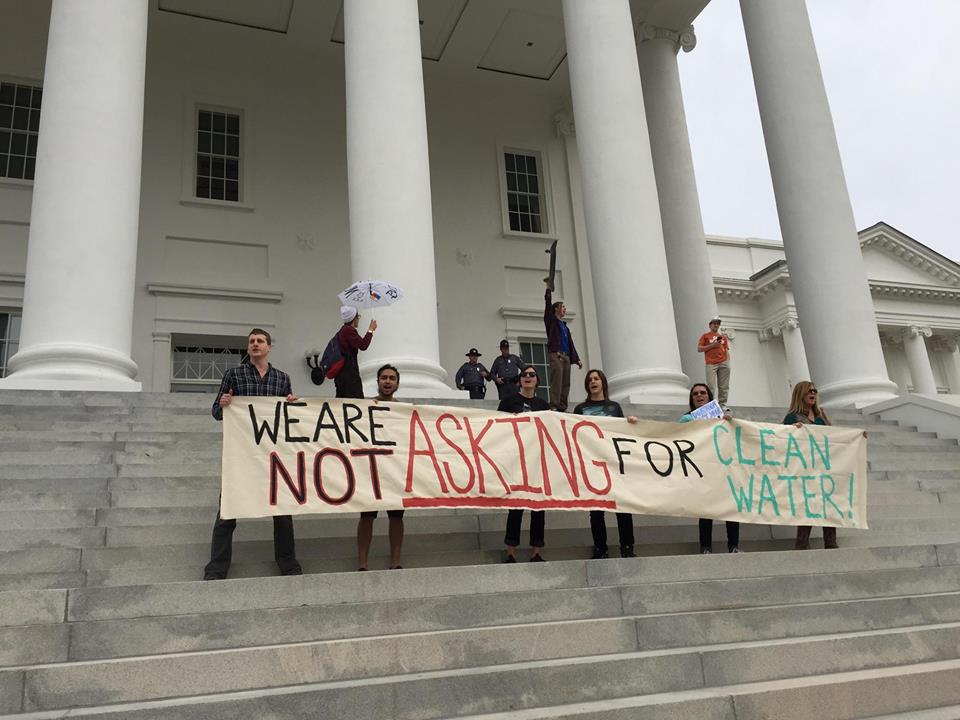
President Obama Keeps Offshore Drilling out of the Atlantic
Last month, climate activists from Virginia to Georgia celebrated a huge victory as President Obama scratched our region from the Bureau of Ocean Energy Management’s (BOEM) draft offshore drilling plan. That decision was the culmination of years of hard work from a diverse and aggressive coalition of groups across the region that refused to allow big polluters to risk our coastline for their climate-denying greed.
This work began heating up last spring when CCAN joined other groups across Virginia to collect written comments in opposition of BOEM’s first draft of the offshore drilling plan that included our coast. Thousands of you sent comments to Washington in the short 90-day comment period, proving that the entire Commonwealth was not in favor of our coast being put at risk. Activists showed up in droves at public listening sessions to ask questions and deliver their comments as well. When that comment period was over, one thing was clear: A formidable coalition had been created and we weren’t going away any time soon.
This year, BOEM announced that they would be releasing their final draft plan for offshore drilling, and climate activists from Virginia to Georgia went on the offensive to expand our anti-drilling coalition to businesses and municipalities. In just three months, we saw over 100 municipalities across the southeast pass resolutions that opposed offshore drilling. In Virginia, the city of Virginia Beach reversed their support for drilling, and Virginia’s Lieutenant Governor Ralph Northam came out in vigorous opposition of offshore drilling. After that groundswell of support, where even the U.S. Navy voiced concerns, President Obama only had one option: Keep it in the ground!
All of this is definitely worth celebrating! However, we must remember that our friends in the Gulf and the Arctic were still left on BOEM’s final draft plan for offshore drilling. Even though they have already seen the detrimental effects of drilling, they must continue to fight and convince President Obama that drilling anywhere is a problem EVERYWHERE. So, please join the fight by signing this petition to President Obama.
I look forward to the victories that we’ll celebrate in the future.
Meet a CCANer: Fracking Fellow Darien Pusey
As a CCAN spring fracking fellow, Darien was a major part of the successful campaign to ban fracking in his home of Prince George’s County!
Your age: 23
Where you live: Upper Marlboro, Maryland.
Your profession: I am a recent graduate of the University of Maryland, College Park with a degree in Environmental Science and Policy. I just started working as a Program Assistant at the D.C. Department of Energy and Environment.
What are the impacts of climate change that hit closest to home for you?
An impact of climate change that hits closest to home for me is asthma. As an Upper Marlboro resident in the lower third of Prince George’s County, I am all too familiar with the dangerous effects that power plants and other major emitters of pollutants and greenhouse gases can have. These sources of pollution are often placed in minority, low-income and rural areas, with any complaints of their harmful effects disregarded or not properly addressed. There are several members in my family who have developed asthma as a result of factors such as poor air quality due to pollution from these sources.
Why did you decide to get involved in taking action on climate?
I decided to get involved in taking action on climate when I noticed the correlation between environmental issues and low-income or minority communities. These communities within the U.S and around the world feel the effects of climate issues the most and often have little to no knowledge or resources to fight it. I felt as though it was my duty to not only protect the health of those people, but to be sure to do my best to give them the tools necessary so that they can also fight for themselves and teach others to do the same.
What has inspired you most working with CCAN?
The thing that inspired me the most working with CCAN, particularly on the Prince George’s fracking ban campaign, was seeing the large variety of supporters coming together, regardless of age, race or economic background in order to push for the common goal of banning fracking in Prince George’s County, eventually resulting in the fracking ban coming to pass! CCAN and their allies were able to draw support from church leaders, community organizations, students, and everyday Prince George’s County residents; without which, the victory against fracking might not have been possible.
What do you hope to see happen in the next year to address climate change in Maryland?
In the next year, I hope to see the whole state of Maryland follow the example set by places such as New York and Prince George’s County and ban the dangerous practice of fracking throughout the state.
What do you like to do when you’re not advocating in your community?
Spending time with family and friends, playing sports (basketball and football), and listening to music
Who would you high five?
I’d high five all of the Prince George’s County residents who gave support, signed petitions, and met with their councilmembers to keep fracking out of Prince George’s County, and who continue to fight to keep the county healthy and safe for all residents.
The Road to Clean Energy Victories in Maryland

My second week at CCAN I stood knee deep in the Baltimore Harbor in a dress and waders cleaning up debris that the tide had washed in. I knew at that moment that I had joined an organization that would do anything to bring clean energy to Maryland. That morning, Mike Tidwell, CCAN’s director, stood waist-deep in the Inner Harbor along with members of the Sierra Club, Working Families, the MD State Chapter of the NAACP, faith and student leaders to show why clean energy was desperately needed in Maryland.
As a broad, diverse coalition spoke behind a podium immersed in water — we began our journey to fight for a 40% clean energy standard in Maryland. The initiative was bold, innovative — yet not impossible. It would take all of us across Maryland working together for years to raise Maryland’s clean energy standard.
We are proud to announce that we have had a momentous year for climate change legislation in Maryland. Governor Hogan signed into law the Greenhouse Gas Reduction Act that will slash emissions by 40% by the year 2030. On Monday, April 11th, on the final day of the 2016 session, the Clean Energy Jobs Act passed the Maryland General Assembly. The Clean Energy Jobs Act raises Maryland’s clean electricity standard to 25% by 2020 and opens up new avenues of funding for minority, small and women-owned businesses in the renewable energy industry. The Clean Energy Jobs Act will ensure that Maryland keeps dirty fossil fuels in the ground while diversifying and expanding Maryland’s wind and solar industry.
For those of you that have worked alongside us for the past few years — you know that these victories did not come easily. It took all of us working together and exploring bold new ways to secure a clean energy future for Maryland.
On the opening day of session in 2015, over 200 activists stood out in the bitter, January cold, holding wind turbines and placards demanding a clean energy future for Maryland. Lawyer’s Mall was crowded with legislative champions Senators Feldman and Madaleno along with labor, civil rights, health and faith voices. Trisha Sheehan, of Mom’s Clean Air Force stated, “Children are among the most vulnerable to climate change, especially from extreme heat events, widespread disease and increased air pollution. Maryland has the ability to double its use of clean energy by 2025. We need to act now to cut our reliance on the dirty fossil fuels that are polluting our air and making us sick.”
turbines and placards demanding a clean energy future for Maryland. Lawyer’s Mall was crowded with legislative champions Senators Feldman and Madaleno along with labor, civil rights, health and faith voices. Trisha Sheehan, of Mom’s Clean Air Force stated, “Children are among the most vulnerable to climate change, especially from extreme heat events, widespread disease and increased air pollution. Maryland has the ability to double its use of clean energy by 2025. We need to act now to cut our reliance on the dirty fossil fuels that are polluting our air and making us sick.”
We worked hard throughout the session to show legislators that reaching a 40% clean energy standard was an achievable goal. A goal that was not only supported by environmentalists — yet was a vital component of our state’s pursuit towards achieving a higher standard of public health, economic well-being and to turn the tide on the injustices that the fossil fuel industry had wrought on low-income and minority communities.
Over a hundred activists gathered once again in Annapolis to meet with their legislators and rally through the  night in February of 2015. Despite the tremendous show of support we ultimately did not pass clean energy legislation in the 2015 session. Legislators balked at the idea of a 40% goal and instead we began to work on a 25% by 2020 standard. We knew that if we hit this critical benchmark that it would put us on the trajectory to achieve a 40% clean energy standard by the year 2025, and we could truly double wind and solar in Maryland. The bill failed in the Senate Finance Committee — yet the result of all of our efforts was that we built an unshakeable foundation and garnered the support of powerful Senate leaders and built a groundswell of grassroots activists.
night in February of 2015. Despite the tremendous show of support we ultimately did not pass clean energy legislation in the 2015 session. Legislators balked at the idea of a 40% goal and instead we began to work on a 25% by 2020 standard. We knew that if we hit this critical benchmark that it would put us on the trajectory to achieve a 40% clean energy standard by the year 2025, and we could truly double wind and solar in Maryland. The bill failed in the Senate Finance Committee — yet the result of all of our efforts was that we built an unshakeable foundation and garnered the support of powerful Senate leaders and built a groundswell of grassroots activists.
After the 2015 session, we did not rest. Instead we continued to work so that we would flood Annapolis with voices from across Maryland. In September, Pope Francis arrived in D.C. with a message for people of faith and conscious, “Never have we so hurt and mistreated our common home as we have in the last 200 years….Yet all is not lost. Human beings, while capable of the worst, are also capable of rising above themselves, choosing again what is good, and making a new start.”
 Faith communities across Maryland answered the Pope’s call to care for creation. Together with Interfaith Power and Light, the Chesapeake Climate Action Network hosted “Climate in the Pulpits” — a statewide effort of faith communities to raise up creation care and climate change in their worship services. On the weekend of September 23rd, over 87 congregations celebrated Climate in the Pulpits by inviting climate activists to give sermons, dedicating their worship message to climate change and signing postcards to their legislators urging them to pass the Greenhouse Gas Reduction Act and the Clean Energy Jobs Act. Maryland State Delegate Dereck Davis (D-25 Prince George’s) participated by speaking on clean energy during the Sunday service at Forestville New Redeemer Baptist Church in District Heights. “Pope Francis has reminded us that addressing climate change is one of the great moral issues of our time,” said Del. Davis. “It is imperative that Maryland acts on climate so that we can create real, broad, and sustainable prosperity.”
Faith communities across Maryland answered the Pope’s call to care for creation. Together with Interfaith Power and Light, the Chesapeake Climate Action Network hosted “Climate in the Pulpits” — a statewide effort of faith communities to raise up creation care and climate change in their worship services. On the weekend of September 23rd, over 87 congregations celebrated Climate in the Pulpits by inviting climate activists to give sermons, dedicating their worship message to climate change and signing postcards to their legislators urging them to pass the Greenhouse Gas Reduction Act and the Clean Energy Jobs Act. Maryland State Delegate Dereck Davis (D-25 Prince George’s) participated by speaking on clean energy during the Sunday service at Forestville New Redeemer Baptist Church in District Heights. “Pope Francis has reminded us that addressing climate change is one of the great moral issues of our time,” said Del. Davis. “It is imperative that Maryland acts on climate so that we can create real, broad, and sustainable prosperity.”
Communities across Maryland also spoke out for the Maryland Greenhouse Gas Emissions Reduction Act (GGRA) — Maryland’s legal mandate to curb greenhouse gas emissions which was set to expire in 2016. The Maryland Climate Commission held meetings across the state from the Eastern Shore to Frostburg, MD. Activists told the Maryland Climate Commission members that not only did they want the to renew the GGRA, they also wanted to strengthen the benchmarks and goals, in order to address the growing threat of climate change.
Next, CCAN and the Maryland Climate Coalition hit the road and embarked on our Energy, Health, and Climate Expo tour throughout Maryland to build a strong alliance of clean energy advocates across the state. Events were held in Baltimore City/County, Charles County, Harford, and Howard Counties. Each event featured our clean energy champions from across the state including — Senator Middleton, Delegate Davis, Delegate Brooks, Delegate Robinson, Maryland Congresswoman Donna Edwards, and spokespeople from Maryland Congressman Chris Van Hollen’s office. Green organizations came together to teach community members about sustainability and how we can work together to combat the growing threat of climate change. This effort culminated in growing our grassroots movement and increased the amount of minorities and low-income community members engaging in our campaigns and advocating for clean energy policies in Maryland.
At the start of the 2016 session, we gained a powerful ally in Maryland State Senator Catherine Pugh, who introduced the  Clean Energy Jobs Act — a bill with a landmark $40 million investment in workforce development and grants for small, minority, and women-owned businesses in the renewable energy industry. On the first day of session, Senator Pugh, lead sponsor of the Clean Energy Jobs Act, gathered with key committee leaders at a press conference in support of the Clean Energy Jobs Act and stated, “We’ll grow Maryland’s clean energy economy in a way that increases the diversity of workers and business owners. As we create more than 1,000 new solar jobs per year, we’ll also give more Marylanders pathways to good-paying careers.”
Clean Energy Jobs Act — a bill with a landmark $40 million investment in workforce development and grants for small, minority, and women-owned businesses in the renewable energy industry. On the first day of session, Senator Pugh, lead sponsor of the Clean Energy Jobs Act, gathered with key committee leaders at a press conference in support of the Clean Energy Jobs Act and stated, “We’ll grow Maryland’s clean energy economy in a way that increases the diversity of workers and business owners. As we create more than 1,000 new solar jobs per year, we’ll also give more Marylanders pathways to good-paying careers.”
Throughout the 2016 legislative session our activists never let up. After record-setting blizzard Jonas, our activists dug themselves out and attended lobby days urging their legislators to vote YES on both the Greenhouse Gas Reduction Act and the Clean Energy Jobs Act. Over the course of the last four months we held over a hundred legislative meetings with many grassroots advocates lobbying for the first time. Tracey Waite, founder of Harford County Climate Action and first time grassroots lobbyist said to one staffer, “When I think about climate change and our future, I feel as if I am in a boat and it has all these holes in it. If someone doesn’t plug the holes then this boat is going to sink. You have the power with both of these bills to stop the ship from sinking, Will you support these bills?”
 On March 17, the Maryland General Assembly approved the landmark Greenhouse Gas Emissions Reduction Act of 2016. The bill, SB 323/HB 610, renews the 2009 Maryland law that set a goal to reduce climate-polluting greenhouse gas emissions statewide by 25 percent by 2020. The 2016 bill further extends the goal to a 40 percent reduction by 2030, requiring deep, long-term cuts in pollution. It received final approval by the House of Delegates after the Senate approved the bill in a 38-8 bipartisan vote in late February.
On March 17, the Maryland General Assembly approved the landmark Greenhouse Gas Emissions Reduction Act of 2016. The bill, SB 323/HB 610, renews the 2009 Maryland law that set a goal to reduce climate-polluting greenhouse gas emissions statewide by 25 percent by 2020. The 2016 bill further extends the goal to a 40 percent reduction by 2030, requiring deep, long-term cuts in pollution. It received final approval by the House of Delegates after the Senate approved the bill in a 38-8 bipartisan vote in late February.
The Greenhouse Gas Reduction Act commits Maryland to one of the highest climate goals in the country, following California and New York.
Following this victory, Mike Tidwell proclaimed, “This bold, and strikingly bipartisan, commitment to stronger climate action will help protect Maryland’s economy, health, and increasingly flooded shoreline. Our climate-vulnerable state is now leading the way, showing that reducing carbon pollution is not a partisan question, but an urgent necessity.”
And in the final hours of the 2016 Maryland General Assembly, the Clean Energy Jobs Act was sent to Governor Hogan’s desk. The Clean Energy Jobs Act passed with an overwhelming bi-partisan majority of members of the House of Delegates with a vote of 92-43 and in the Senate with a vote of 31-14. Lead Senate Sponsor, Catherine Pugh stated, “This vote is a major step toward growing Maryland’s clean energy economy. This bill will create good-paying jobs and healthier air for communities in Baltimore and across Maryland that urgently need both.”
The journey that started with an underwater press conference in Baltimore City has now spread across the state of Maryland. Thanks to all of you that have made this possible and let’s continue to win more victories for Maryland, for our climate, and for our future.



